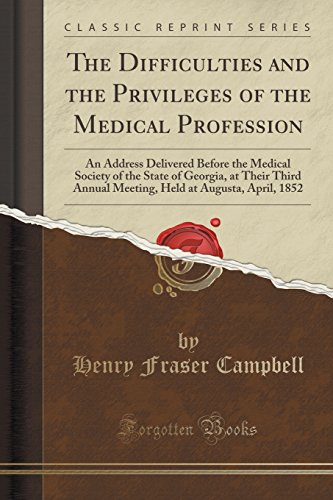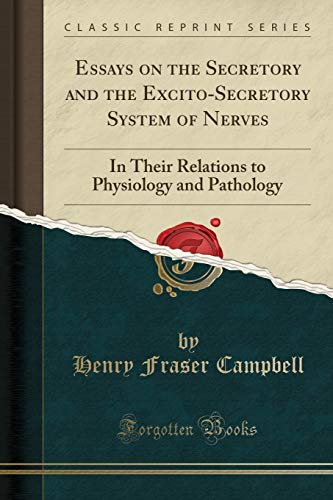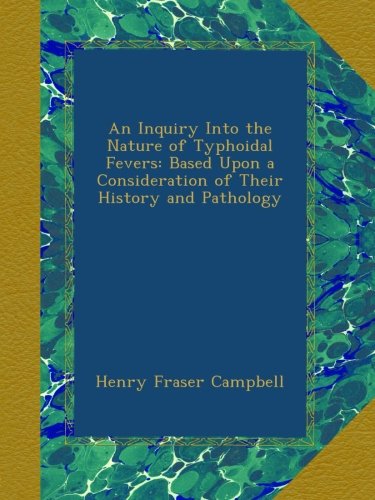Background
Henry Fraser Campbell was born on February 10, 1824 in Augusta, Georgia, United States; the son of James C. Campbell of Ireland and his wife, Mary R. Eve, an American.



(Excerpt from The Difficulties and the Privileges of the M...)
Excerpt from The Difficulties and the Privileges of the Medical Profession: An Address Delivered Before the Medical Society of the State of Georgia, at Their Third Annual Meeting, Held at Augusta, April, 1852 Ties around the heart are spun, Which cannot, will not be undone. He has entered the sanctum of their domestic affliction; he has seen and sympathised in their grief; a mutual sorrow melts his heart with theirs; and henceforth a mutual tender reminiscence must ever bind them togeth er in friendly trust and confidence. And, lastly, we may contemplate with much pleasure the great privilege which we enjoy as Physicians, in living in the present age of our Profession - An age in which Science may be said to have reached her culmin ating point of energy and enthusiasm - when every department is in a turmoil of research and discovery when every day adds new and rich stores to the vast magazines of our knowledge - and when learned Con ventions and Associations are organized in every part of our great country, to systematize, to improve, and to perfect all branches of our Profession. About the Publisher Forgotten Books publishes hundreds of thousands of rare and classic books. Find more at www.forgottenbooks.com This book is a reproduction of an important historical work. Forgotten Books uses state-of-the-art technology to digitally reconstruct the work, preserving the original format whilst repairing imperfections present in the aged copy. In rare cases, an imperfection in the original, such as a blemish or missing page, may be replicated in our edition. We do, however, repair the vast majority of imperfections successfully; any imperfections that remain are intentionally left to preserve the state of such historical works.
https://www.amazon.com/Difficulties-Privileges-Medical-Profession-Delivered/dp/1331067812?SubscriptionId=AKIAJRRWTH346WSPOAFQ&tag=prabook-20&linkCode=sp1&camp=2025&creative=165953&creativeASIN=1331067812

(Excerpt from Essays on the Secretory and the Excito-Secre...)
Excerpt from Essays on the Secretory and the Excito-Secretory System of Nerves: In Their Relations to Physiology and Pathology The classification of febrile diseases found in the introduction to this volume, we sincerely believe to be the true one, and with truth for its basis, we do not hesitate to predict that, in time, it must become the accepted one. About the Publisher Forgotten Books publishes hundreds of thousands of rare and classic books. Find more at www.forgottenbooks.com This book is a reproduction of an important historical work. Forgotten Books uses state-of-the-art technology to digitally reconstruct the work, preserving the original format whilst repairing imperfections present in the aged copy. In rare cases, an imperfection in the original, such as a blemish or missing page, may be replicated in our edition. We do, however, repair the vast majority of imperfections successfully; any imperfections that remain are intentionally left to preserve the state of such historical works.
https://www.amazon.com/Essays-Secretory-Excito-Secretory-System-Nerves/dp/1331247500?SubscriptionId=AKIAJRRWTH346WSPOAFQ&tag=prabook-20&linkCode=sp1&camp=2025&creative=165953&creativeASIN=1331247500

(This book was originally published prior to 1923, and rep...)
This book was originally published prior to 1923, and represents a reproduction of an important historical work, maintaining the same format as the original work. While some publishers have opted to apply OCR (optical character recognition) technology to the process, we believe this leads to sub-optimal results (frequent typographical errors, strange characters and confusing formatting) and does not adequately preserve the historical character of the original artifact. We believe this work is culturally important in its original archival form. While we strive to adequately clean and digitally enhance the original work, there are occasionally instances where imperfections such as blurred or missing pages, poor pictures or errant marks may have been introduced due to either the quality of the original work or the scanning process itself. Despite these occasional imperfections, we have brought it back into print as part of our ongoing global book preservation commitment, providing customers with access to the best possible historical reprints. We appreciate your understanding of these occasional imperfections, and sincerely hope you enjoy seeing the book in a format as close as possible to that intended by the original publisher.
https://www.amazon.com/Inquiry-Into-Nature-Typhoidal-Fevers/dp/B00AP8T4Y0?SubscriptionId=AKIAJRRWTH346WSPOAFQ&tag=prabook-20&linkCode=sp1&camp=2025&creative=165953&creativeASIN=B00AP8T4Y0
Henry Fraser Campbell was born on February 10, 1824 in Augusta, Georgia, United States; the son of James C. Campbell of Ireland and his wife, Mary R. Eve, an American.
He received an academic education, supplemented by a classical course under a private tutor, and entered the Medical College (now University) of Georgia where he received his M. D. in 1842. In the same year he established himself in Augusta.
Until the outbreak of the Civil War Campbell practised his profession in Augusta. He was commissioned surgeon in the Confederate army, 1861, and served as a member of the Army Board of Medical Examiners and as medical director of the General Military Hospital at Richmond, Virginia. He prepared parts of the Confederate Manual of Military Surgery (1863). He occupied various teaching positions at the Medical College of Georgia, as professor of comparative and microscopical anatomy (1854 - 57), professor of anatomy (1857 - 66), and from 1868 to the end of his life, professor of orthopedic surgery and gynecology. During this period he was clinical lecturer in the several hospitals of Augusta. Except for the years of the Civil War, his only lengthy absence from the city of his birth was from 1866 to 1868 when he was successively professor of anatomy and professor of surgery at the New Orleans School of Medicine.
In 1850 he read an "Essay on the Influence of Dentition in Producing Disease" (Minutes of the Medical Society of Augusta, May 2, 1850). In 1851 he published "Law Governing the Distribution of Striped and Unstriped Muscular Fibre". Later came articles on excito-secretory action, on reflex vasomotor action as a basis of certain diseases, on the nervous system in febrile diseases, etc. His work on the sympathetic nerves in reflex phenomena was much discussed and on March 2, 1857, he laid claim to priority over Claude Bernard, the famous French physiologist. Dr. Marshal Hall, F. R. S. , of London, adjudicated the claim and found that "the idea and designation of excito-secretory action belonged to Dr. Campbell but his details are limited to pathology and observation. The elaborate experimental demonstration of reflex excito-secretory action is the result of the experimental labours of M. Claude Bernard. "
His observations on the abortive treatment of gonorrhea (1845), epidemic dengue fever (1851), the nature of typhoidal fever (1853), unusual forms of dysentery (1851), registration and sanitation (1875), the railroad transmission of disease germs (1876), quarantine in relation to yellow fever germs (1879) and the non-contagiousness of that disease (1880), all reflect a clear logical mind and conceptions of the nature of communicable disease well in advance of his time. His unusual powers of observation were never better demonstrated than in his presentation of his ideas on the transmission of yellow fever before the American Public Health Association's seventh annual meeting (1880), when he vigorously defended his assertion of the portability of atmospheric germs and the non-contagiousness of the disease. From 1857 to 1861, in conjunction with his brother, Dr. Robert Campbell, he was editor of the Southern Medical and Surgical Journal, published at Augusta.
He is best known for his original studies on the nature of the autonomic nervous system. Campbell was also a pioneer in preventive medicine. In 1857 he was awarded the prize of one hundred dollars at the tenth annual meeting of the American Medical Association for his investigation of the excito-secretory system.
(Excerpt from Essays on the Secretory and the Excito-Secre...)
(Excerpt from The Difficulties and the Privileges of the M...)
(This book was originally published prior to 1923, and rep...)
He was president of the Georgia Medical Association (1871), correspondent of the Academy of Natural Sciences of Philadelphia (1858), corresponding member of the Imperial Academy of Medicine of St. Petersburg (1860), a founder of the American Gynecological Society (1876), and member of the Georgia Board of Health (1875). He was elected vice-president (1858) and finally president of the American Medical Association and presided at its meeting in New Orleans in 1885.
On June 17, 1844, he married Sarah Bosworth, daughter of Amory Sibley.
